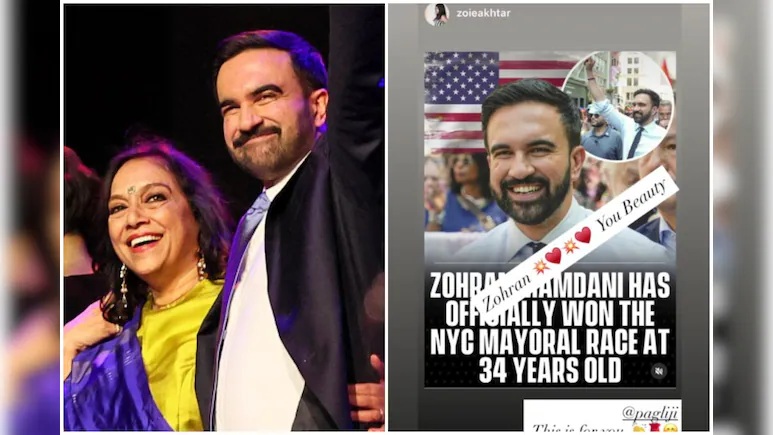Zohran Mamdani’s win as New York mayor marks a major breakthrough for progressives and a challenge to the Democratic establishment — though not necessarily a direct defeat for Donald Trump, whose influence remains strong beyond America’s cities

Filmmaker Mira Nair with son Zohram Mamdani. Courtesy: https://www.ndtv.com/world-news
By Newswriters News Desk
The stunning election of Zohran Mamdani as the new mayor of New York City has sent ripples across the American political landscape. The 33-year-old progressive Democrat’s decisive win over former governor Andrew Cuomo has been hailed as a major breakthrough for the left wing of the Democratic Party — and a possible signal of shifting national moods ahead of the 2026 midterms and the 2028 presidential race.
However, analysts caution that while Mamdani’s triumph marks a leftward swing in urban America, it is not necessarily a direct political defeat for former President Donald Trump or his brand of populist conservatism. Rather, it reflects growing frustration among voters with both traditional party establishments and widening inequality in U.S. cities.
A Progressive Upset
Zohran Mamdani, born in Uganda to Indian parents and raised in New York, represents a new generation of American politicians: young, diverse, and unapologetically progressive. Running on a platform that included rent freezes, free public buses, universal childcare, and higher taxes on the wealthy, he won in a landslide — an outcome few predicted at the start of the campaign.
His message — that “government must guarantee dignity, not just opportunity” — resonated deeply with voters struggling under New York’s soaring housing costs and economic pressures. The result is being seen as both an endorsement of progressive policies and a rebuke to the Democratic establishment that has long dominated the city’s politics.
Political observers point out that Mamdani’s victory mirrors earlier urban shifts, including the elections of Brandon Johnson in Chicago, Michelle Wu in Boston, and Karen Bass in Los Angeles — all leaders who rose on platforms emphasizing social equity, public investment, and affordable living.
“This isn’t just a city election — it’s part of a larger realignment,” said political analyst Maria Torres of Columbia University. “The Democratic center of gravity is moving left, driven by young voters and economic insecurity. Mamdani’s win is the clearest signal yet.”
A Challenge to the Democratic Establishment
Within the Democratic Party, Mamdani’s win has intensified debates between moderates and progressives. Centrist Democrats, who favor pragmatic governance and fiscal restraint, worry that the party’s growing embrace of redistributive policies could alienate suburban swing voters. Progressives, on the other hand, argue that bold economic populism — focused on housing, wages, and public welfare — is exactly what can re-energize a disillusioned electorate.
“Mamdani proved that you can talk about class, rent, and inequality — and win big,” said a campaign strategist close to the Sanders–Ocasio-Cortez wing of the party. “It’s a roadmap for 2026.”
If Mamdani delivers on even part of his ambitious agenda, political experts say, it could reshape the national conversation ahead of the next presidential cycle. But if his policies falter amid budgetary constraints or bureaucratic resistance, it could reinforce arguments that progressive governance is aspirational but impractical.
Trump and the National Context
While Mamdani’s victory has been widely described as a blow to the political establishment, calling it a direct defeat for Donald Trump would be an exaggeration. The former president was not on the ballot, and New York remains a deep-blue stronghold where Republicans have struggled to make inroads for decades.
Yet, symbolically, Mamdani’s success undercuts several pillars of Trump-era politics — notably anti-immigrant rhetoric, cultural polarization, and economic populism framed through nationalism rather than equity.
“Mamdani’s appeal is also populist, but it’s inclusive rather than divisive,” said veteran political commentator Howard Klein. “He’s redefining populism around class, not identity — and that’s a challenge to both Trump and the Democratic centrists.”
The timing adds to the perception of shifting political winds. Across the country, Democrats made notable gains in several 2025 local and state elections, including gubernatorial races in New Jersey and Virginia. Trump-endorsed candidates underperformed, prompting speculation that voters may be growing weary of his confrontational politics.
Still, Republican strategists insist the New York result does not indicate a broader national trend. “This was a local race in one of the bluest cities in America,” said GOP consultant Greg Whitman. “It tells us nothing about how America’s heartland will vote in 2026 or 2028.”
An Urban Shift, Not a National Swing — Yet
Mamdani’s win undeniably underscores the growing influence of progressive politics in major U.S. cities. His campaign successfully mobilized young voters, renters, immigrants, and working-class communities — groups increasingly alienated from both corporate Democrats and Trump-style Republicans.
But whether this urban leftward shift can translate into a national realignment remains uncertain. American politics continues to be geographically divided — with progressive cities surrounded by conservative suburbs and rural areas where Trump’s populism still runs deep.
The Road Ahead
The true test for Zohran Mamdani begins now: governing. New York’s fiscal challenges, powerful real estate interests, and complex bureaucracy will determine how far he can advance his ambitious social agenda.
If he succeeds, it could mark the consolidation of a new, inclusive populism in U.S. politics — one that combines economic justice with multicultural identity. If he falters, moderates and Republicans alike will cite it as evidence that idealism cannot sustain governance.
For now, Mamdani’s victory represents a moment of possibility — a signal that American politics, weary of polarization and inequality, may be searching for a new direction. Whether that direction leads leftward across the nation will depend on whether his promises can withstand the hard realities of power.



